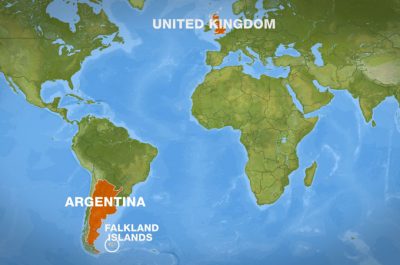Argentina Wants to Recover the Falkland Islands

The desire to regain sovereignty over the Falkland Islands (called “Malvinas” by the Argentines) has for decades been deeply rooted in the Argentine people. In fact, the British occupation of the territory, made possible by the English victory in the Falklands War in 1982, was never well accepted by Argentina, so that the desire of retaking the islands persists. In general, Argentine governments have kept the dream of recovering the islands alive, except for some personalities strongly associated with foreign interests, such as the former president Mauricio Macri, who has ruled the country for the past four years with a passive stance towards the British rule. In this sense, things are changing in Buenos Aires.
With Fernandez, the Argentine government is taking a more proactive stance towards the Falklands. The Malvinas Islands Affairs Council was recently created, and, with this, a new submarine territorial demarcation was established claiming Argentine sovereignty over the Islands. The Council’s main objective is to transform the cause of the reconquest of the Falkland Islands into a matter of national priority. Fernandez’s policy has a great prospective character and is not restricted to the current president’s activity. The main merit of the creation of the Council is an officialization of the Argentine state position in relation to the Islands. Now the issue is no longer subordinated to the current president’s particular opinion, but there is an official state position that must be respected by all Argentine statesmen: that Buenos Aires must reconquer the Falkland Islands.
The new Council will be led by the president and integrated by the Minister of Foreign Affairs, the secretary of the Chancellery of the Malvinas and a deputy and a senator appointed by each of the three blocks with the greatest parliamentary representation. In addition, it will be integrated by the governor of Tierra del Fuego, Antarctica and the South Atlantic Islands, two experts in international law, three representatives from the academic and scientific sector and some representatives of ex-combatants from the Falkland Islands War – a decision particularly celebrated among the Argentine military. As we can see, civil, political, military and academic societies are integrated into the work of the Council.
In March 2017, the United Nations approved the expansion of the Argentine maritime space in more than 1.7 million km2, which increased it to more than 6.5 million km2. This means an increase of 35% in its sovereignty area, which would give it control over the natural resources of the underwater soils and subsoils. As decided by the UN, the submarine territory will be extended from 200 nautical miles to 350. The new law strengthens sovereign rights and increases legal security in the context of the exploitation of hydrocarbons and minerals. Since 2010, oil companies have been exploring and developing hydrocarbon extraction in waters close to the islands. In March 2011, the Argentine Congress banned oil activities on the Argentine continental shelf without “authorization”, which the United Kingdom described as illegal.
The new government’s foreign policy seems quite bold, but consistent with the current geopolitical reality. Fernandez is ending the four-year cycle of a conciliatory policy with British occupation and beginning a journey in search of the recovery of the Islands. From the point of view of international law, Fernandez’s attitude may be questionable, since British sovereignty is now recognized, however, a deeper investigation will lead to the question of how such British sovereignty over the region took place. The Islands have been under dispute since at least 1833. In the 1980s, with the war, the British consolidated their dominance in the region by the use of force. However, claims about the place differ. Not only Argentina, but even Spain has already claimed to have rights over the region. In fact, British law is currently recognized in the Islands, but it is not known how such recognition actually arose – there is no treaty or any other legitimate origin of British domination outside of military occupation and war, which are not recognized by international law – so Argentina is right to claim sovereignty over this region, since it lies within the territorial limits of the Argentine maritime space.
Sovereignty over the Falkland Islands would guarantee Buenos Aires control over an area rich in natural resources, conducive to fishing, commercial navigation and advanced scientific research, with notorious proximity to the Antarctic territory. The reasons that lead Argentines and British to seek the Islands are the same and as long as there is no reason to actually determine a legitimate origin of British control Argentina will have the right to claim sovereignty over a region within its territorial limits.
*
Note to readers: please click the share buttons above or below. Forward this article to your email lists. Crosspost on your blog site, internet forums. etc.
This article was originally published on InfoBrics.
Lucas Leiroz is a research fellow in international law at the Federal University of Rio de Janeiro.
Featured image is from InfoBrics

